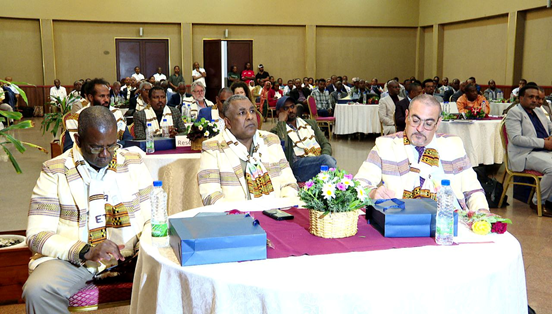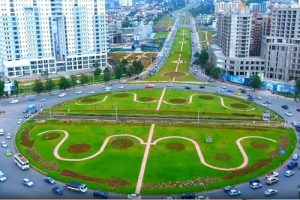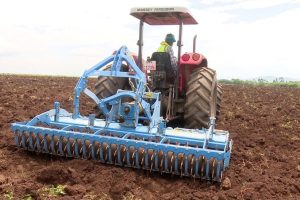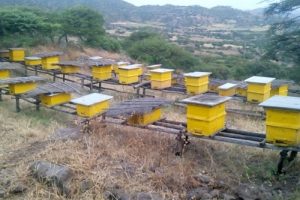
In an effort to reduce poverty, enhance food security, and build resilience to climate shocks, Ethiopia has embarked on a ground breaking programme called the Participatory Agriculture and Climate Transformation (PACT). This ambitious program aims to uplift rural households by improving their incomes and nutrition security while promoting sustainable agricultural practices.
The Programme Development Objective (PDO), specifically, targets the sustainable improvement of incomes, food and nutrition security, and climate resilience for rural households, including men, women, youth, and persons with disabilities.
The Participatory Agriculture and Climate Transformation (PACT) Programme, with a total budget of US$180.64 million, is poised to make a lasting impact on the lives of 150,000 households across nine regional states (Amhara, Oromia, Tigray, South Ethiopia, Central Ethiopia, South West Ethiopia, Sidama, Somali, and Afar).Consequently, The PACT Programme’s geographic reach spans 90 food-insecure woredas across such the nine regions.
The PACT Programme, with a seven-year implementation plan, is a collaborative effort between international organizations, the Ethiopian government, and private sector entities. It aims to empower rural communities, promote sustainable practices, and strengthen institutions to drive long-term economic growth and improved livelihoods.
The programme’s key objectives include sustainable improvements in income, food and nutrition security, and climate resilience for rural households.
By fostering community-led climate-smart production, agribusiness development, and institutional and policy strengthening, the PACT Programme seeks to create a conducive environment for sustainable agriculture and inclusive growth.
The PACT Programme is a collaborative effort supported by various partners or stakeholders and its total cost is US$180.64 million. The International Fund for Agricultural Development (IFAD), The Bill and Melinda Gates Foundation (BMGF) and the European Commission (EC) and others have contributed significant funding to the program.
Additionally, the Ethiopian government and private sector entities as well as beneficiaries themselves are actively involved in financing and implementing.
By enhancing sustainable and equitable access to natural resources, expanding market opportunities, and strengthening institutions, the programme aims to uplift rural communities, increase agricultural productivity, and create economic opportunities.
The PACT Programme represents a significant step towards a brighter future for Ethiopia’s rural communities and sustainable agricultural development.
The speeches by the Minister of Agriculture, Girma Amente (PhD), the IFAD Country Director, Mawira Chitima, the State Minister of Agriculture Professor Eyasu Elias and the Manager of PACT Nuredin Asaro emphasized the collaborative nature of the program. They highlighted the importance of strong alliances between governments, development partners, research institutions, and the private sector to address the complex challenges faced by the agricultural sector.
The Minister of Agriculture acknowledged the daily struggles faced by rural communities, including climate change, poverty, and other challenges. He emphasized the need to go beyond conventional approaches and embrace innovation to find sustainable solutions. He highlighted Ethiopia’s rich agricultural heritage and the crucial role of small-scale farmers in ensuring food security for the nation.
Dr.Girma emphasized the importance of harnessing the power of innovation to empower these communities and enable them to thrive in a changing world. He mentioned the home-grown economic reform agenda, which focuses on inclusive economic growth, poverty reduction, and improving the well-being of the Ethiopian population. The Minister underlined the transformation of the agricultural sector as a prerequisite for economic growth and food security.
“Although we have been challenged by decades of climate-change induced weather variability, the transformation of the agricultural sector in Ethiopia is mandatory to ensure overall economic growth and to achieve food and nutrition security for growing national population,” he mentioned.
“Accordingly, in collaboration with our development partners, we are consistently working towards fostering green and climate-resilient agricultural growth,” he said.
As of him, no single entity can address the complex challenges they face alone. They must forage strong alliance between governments, development partners, research institutions, and the private sector. Together they can pool their resources, share best practices, and amplify the impact of their efforts.
The nation plans to plant 50 billion seedlings by 2026 and 32.5 billion seedlings of various trees have been planted with survival rate of over 80 %. Fruit trees such as avocado that were planted as part of agro forestry system have enabled Ethiopia to become amongst the top producer and exporter of avocado fruits in Africa, as to the Minister.
“Tomorrow begins today, the decision we make, the actions we take, and the commitments we forage will shape the future of rural communities” the Minister underlined.
According to Girma, the launching of this program is a significant milestone for Ethiopia’s agricultural sector which is expected to address the challenges facing the sector, particularly in terms of climate change, land degradation water scarcity.
Moreover, the programme will have a significant impact on the lives of millions of Ethiopians, especially smallholder farmers who are the backbone of the sector through sustainable improvement of incomes, food, and nutrition security, and resilience to climate shocks, the Minister stated.
The Ministry of Agriculture will take every possible measure required for the successful implementation of the program, the Minister promised.
IFAD Country Director, Mawira Chitima expressed admiration for Ethiopia’s initiatives in climate change adaptation and achieving food self-sufficiency. He mentioned IFAD’s support for smallholder farmers and its significant contribution to such activities.
Chitima emphasized IFAD’s commitment to empowering women and youth in selected rural areas of Ethiopia. He highlighted the importance of partnerships with organizations like IFAD, which support small-scale irrigation development and sustainable natural resource management.
Chitima acknowledged the transboundary impacts of climate change and emphasized the need for collaborative efforts to bring about meaningful change. He commended the launching of the PACT programme as a pivotal moment for Ethiopia’s agricultural sector and its commitment to resilience, innovation, and sustainability.
Professor Eyasu Elias, State Minister of Agriculture, stated that the PACT Programme aimed to implement sustainable and innovative practices to enhance the resilience of agricultural systems. He mentions the adoption of climate-smart technologies, promotion of water-efficient irrigation methods, and the dissemination of knowledge and best practices among the farming communities.
Professor Eyasu highlighted the community-led approach of the PACT Programme, which places local communities at the centre of decision-making processes. He acknowledged IFAD as a key partner in supporting small-scale irrigation development and sustainable natural resource management.
Professor Eyasu emphasized the significance of partnerships with IFAD and other donors and their role in creating meaningful change. He sees the launching of the PACT programme as a crucial step toward building a resilient and sustainable agricultural sector.
Nuredin Asaro, Manager of PACT, provided an overview of the PACT Programme, stating that it will span seven years of implementation and benefit 150,000 households across the nine regional states. He mentioned the targeted woredas and regions where the program will be executed.
Nuredin highlighted the Programme Development Objective (PDO) of sustainable improvements in income, food and nutrition security, and climate resilience for rural households.
The manager explained the three interdependent components of the PACT Programme: community-led climate-smart production and landscapes, agribusiness development, and institutional and policy strengthening.
Nuredin emphasized the collaborative nature of the program, with support and resources from international organizations, the Ethiopian government, and the private sector. He sees the PACT Programme as transformative, focusing on poverty alleviation, food security, and climate resilience.
By empowering rural households, promoting sustainable practices, and strengthening institutions, the program sets the stage for long-term economic growth and improved livelihoods, the manager concluded.
BY BAHIRU SETEGNE
THE ETHIOPIAN HERALD TUESDAY 27 FEBRUARY 2024





